Biosecurity is the management of the risk of pests and diseases entering, emerging, establishing or spreading in Australia and causing harm to animals, plants or human health, the economy, the environment and the community.
Recognising our biosecurity stars
Australia’s largest banana farm and a partnership that stopped invasive fire ants from coming to Australia in shipments of lawnmowers were among the winners at this year’s Australian Biosecurity Awards.
Deputy Secretary for Biosecurity, Lyn O’Connell, announced the winners at the ABARES Outlook Conference dinner on 6 March 2018.
The Australian Biosecurity Awards recognise individuals, groups and organisations that are committed to supporting and promoting Australia’s biosecurity, from industry and government.
Amongst this year’s winners were First Point Animal Services, a unique indoor facility used for the safe transfer of animals at Melbourne’s Tullamarine Airport, sheep farming veteran Geoff Power for his advocacy for livestock producers and Wildlife Health Australia’s Keren Cox-Witton for her ongoing efforts to raise awareness of a fungal disease affecting bats, known as white-nose syndrome, and prevent its introduction into Australia.
Continue reading about recognising our biosecurity stars
Tony Beaver, former Director of the Food and Beverage Importers Association, took out the prestigious David Banks Biosecurity Lifetime Achievement Award — which is dedicated to the memory of Dr David Banks, who brought scientific and practical ingenuity, and policy leadership to Australia’s biosecurity. Tony was recognised for his contribution to the regulation of imported foods and beverages and advocacy for collaboration between industry and government, which has led to a more effective regulatory system.
The 2018 winners have played instrumental roles in ensuring Australia’s biosecurity system supports the future of Australian agriculture.
Learn more about the winners at Australian Biosecurity Awards.
All the Award Winners
2018 David Banks Lifetime Achievement Award:
- Tony Beaver, Victoria
2018 Australian Biosecurity Award in the Industry category:
- First Point Animal Services, Victoria
- Geoff Power, South Australia
- John McDonald, Nursery and Garden Industry Australia, New South Wales
- Keren Cox-Witton, Wildlife Health Australia, New South Wales
- Husqvarna Australia Pty Ltd, Cahill Transport Australia, Panalpina World Transport Pty Ltd
2018 Australian Biosecurity Award in the Farm Biosecurity Producer of the Year category:
- Mackay Farming Group, Queensland
- Rum Jungle Organics, Northern Territory
2018 Australian Biosecurity Award in the Government category:
- Grains Farm Biosecurity Program
- Lois Ransom, Department of Agriculture and Water Resources
Don't risk Australia's biosecurity when you travel
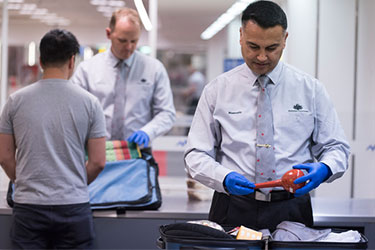 Increased overseas travel means an increased risk of new pests and diseases entering Australia.
Increased overseas travel means an increased risk of new pests and diseases entering Australia.Live toads hiding in shoes in Melbourne and 5.5 kilograms of cow dung in Brisbane are among thousands of items intercepted by biosecurity officers at Australia’s international airports last year.
In 2017, 296,606 biosecurity risk items were intercepted at Australian international airports—up 8 per cent from 2016.
Meat products were the most common, with 23,797 seizures at Sydney International Airport alone. Seafood interceptions were also high across most international airports with 7,717 items.
The rise in seizures highlights the need for international travellers to think about what they bring into Australia.
Continue reading about don't risk Australia's biosecurity when you travel
“Australia is lucky to be free from many pests and diseases. But increased overseas travel means an increased risk of new pests and diseases entering Australia that could seriously impact our environment, agricultural industries and plant, animal and human health status,” Deputy Secretary, Lyn O’Connell, said.
“The onus is on people to do the right thing. To think about what they pack and if they’re unsure, to check the department’s website. To fill out the Incoming Passenger Cards correctly, declare everything honestly and leave airline food on the plane,” said Ms O’Connell.
“Biosecurity officers target deliberate concealment and non-compliance with our biosecurity laws using detector dogs and x-ray machines. Breaking biosecurity laws can have serious consequences, including criminal prosecution and fines in excess of $250,000.”
Meat products, particularly pork, can carry foot and mouth disease, which, if established in this country, could cost Australia $50 billion over a decade.
You can read about some of the more unusual biosecurity risk items that have been detected at Australian international airports in Border Finds.
Find out more about what can and can’t be brought into Australia.
Making a buzz about biosecurity

Botanist Helen Kennedy appeared on Brainbuzz to talk about invasive species.
Department botanist, Helen Kennedy, recently appeared on Channel Nine’s new science show for children, Brainbuzz. Helen spoke about invasive species, their potential impact, and what we do to manage them.
Introduced as a ‘biosecurity botanist’, Helen explained that any kind of plant can be a weed if it’s growing in the wrong place. She gave the children the chance to be a botanist, by identifying an invasive plant, prickly pear, and the species it can impact on, including tomato, strawberry and eggplant.
Helen talked about the simple things everyone can do to keep invasive plant species out of Australia. This included making sure that you don’t bring plants or seeds back with you when you go overseas, and checking the department’s website before sending mail to Australia or shopping online.
Continue reading about making a buzz about biosecurity
She also explained how important it is to keep an eye out for unusual plants or weeds in your garden and to report any unexpected discoveries.
While the department is responsible for protecting Australia’s biosecurity from the threat of foreign pests and diseases, it can’t do it alone.
Educating the public about what they can do to help is a big part of what the department does. It’s never too early to tell people what they should be looking out for.
Biosecurity is a shared responsibility and all Australians are urged to look out for and report sightings of unusual plant pests to 1800 084 881.
Busting biosecurity myths
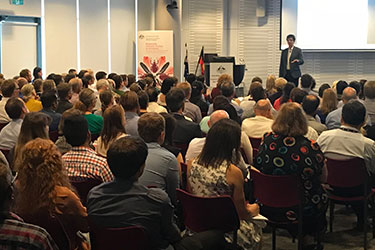 Professor Kompas discussed myths associated with biosecurity risk assessment.
Professor Kompas discussed myths associated with biosecurity risk assessment.Staff gathered in Canberra in February to hear Professor Tom Kompas from the Centre of Excellence for Biosecurity Risk Analysis (CEBRA) speak. He discussed the ‘Three Great Myths in Risk Assessment’ and their importance in biosecurity risk management.
The seminar looked at examples from CEBRA biosecurity research projects to examine three myths:
- Risk is measured by the probability of an event multiplied by its consequence, as best summarised in a risk or heat map.
- ‘Nature makes no jumps’ and/or ‘Probabilities can only be measured with extensive data and statistical techniques’.
- It is always best to invest in the risk-mitigating activity that has the highest benefit-cost ratio.
Professor Kompas spoke about sources of bias that can affect risk assessments and took the audience through CEBRA’s Integrated Elicitation (IDEA) process.
Continue reading about busting biosecurity myths
He highlighted problems with using techniques like heat maps and peer assessment for risk assessment. He also discussed the significance of large random events and drew attention to the importance of diversity when determining risk.
“It’s an error to allocate resources according to benefit-cost ratios, since benefits and costs depend on the scale of the activity,” said Professor Kompas.
“Instead, resources should be allocated based on the relative rates of return, or the extra benefits relative to the extra costs that an investment delivers.”
Professor Kompas also highlighted the point that “the likelihood, or the probability, of a biosecurity event occurring can take discrete ‘jumps’. Moreover, the entire distribution of likely outcomes may shift so that what once seemed like an extreme event is now more common. Biosecurity planning needs to account for this.”
The department’s relationship with CEBRA is significant. It provides world-class research and understanding of the issues, risks and response mechanisms to underpin policy interventions and tools. CEBRA ensures that governments are leaders in practical risk assessment by providing collaborative, relevant and practical research outcomes.
Helping our closest neighbour with a plant and animal health check
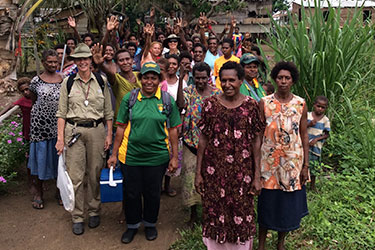 The survey team undertook a wide range of biosecurity monitoring activities.
The survey team undertook a wide range of biosecurity monitoring activities.In February, we worked with Papua New Guinea’s National Agricultural Quarantine and Inspection Authority (NAQIA) to complete a plant and animal health survey of the six eastern treaty villages. This survey complemented a similar survey of the western treaty villages undertaken in 2017.
The ‘Treaty Villages’ are recognised under the Torres Strait Treaty between Australia and Papua New Guinea due to strong family, cultural and traditional trading ties with residents in the Torres Strait Protected Zone.
In particular, we’re concerned about the movement of exotic pests, disease and weeds southwards from Papua New Guinea into the Torres Strait islands, and then ‘island hopping’ onto mainland Australia. Papua New Guinea wants to make sure the reverse does not happen.
Continue reading about helping our closest neighbour with a plant and animal health check
Participants from Australia included Barbara Waterhouse (survey leader, senior botanist), Lynne Jones (plant pathologist), Stacey Anderson (entomologist), Cassandra Wittwer (veterinarian) and Monty Naawi (Torres Strait Biosecurity Officer).
NAQIA participants were Marilyn Apa (team leader, plant pathologist), Annastasia Kawi (entomologist) and Tom Malaisa (senior animal health officer).
A far north Queensland-based charter vessel, Eclipse D, provided the survey platform and logistical support for the survey.
Barbara Waterhouse explained the survey team went to great lengths to follow cultural protocols with each village they visited.
“We held a community meeting at each village prior to undertaking survey activities. Each team member was introduced and we provided an overview of our survey objectives. The meetings also gave community members an opportunity to ask questions on any aspects of local and regional biosecurity. Residents in each village confirmed they had family and connections throughout the Torres Strait and in many cases on the Indonesian side of the PNG/Indonesia border,” said Ms Waterhouse.
“Our key message was that there are biosecurity risks associated with moving animals, plants or other biosecurity risk items into and out of the region. For example, from elsewhere in PNG, from across the border in Indonesian Papua and from the Torres Strait islands into the treaty villages. As well as the movement of plants and animals from the treaty villages towards the Torres Strait islands,” said Ms Waterhouse.
The survey team undertook a range of biosecurity monitoring activities. Specimens were collected for diagnostics and fruit fly traps were hung in trees in several of the villages to collect specimens.
Tracking collars were placed on 40 dogs for six nights in one village as part of a University of Sydney rabies preparedness project and a small number of chickens and pigs encountered in villages received a health check.
Diagnostics on specimens collected throughout the survey will be completed over the coming weeks and Ms Waterhouse stressed it is too early to indicate final outcomes.
“Any suspect samples will be prioritised for diagnosis or identification. The team observed various plant pests and diseases we don’t have in Australia, including sugarcane borers, banana leaf rollers and taro leaf blight, but we know that these have been present in the villages for many years. Currently, it is the team’s impression that we are unlikely to find anything unexpected,” said Ms Waterhouse.
The team also distributed a small volume of biosecurity Top Watch merchandise such as calendars, bilums, caps and pannikins in each village.
“The Torres Strait calendars are an important biosecurity messaging tool for the treaty villages as well as the Torres Strait islands,” said Ms Waterhouse.
The survey was funded through the Australian Government’s Agricultural Competitiveness White Paper.
White Paper funds boost citrus pest surveillance
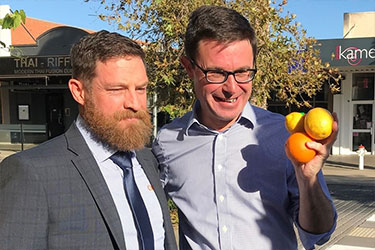 Citrus Australia CEO Nathan Hancock (left) and Minister Littleproud (right) at the launch of the strategy. Image courtesy of Citrus Australia.
Citrus Australia CEO Nathan Hancock (left) and Minister Littleproud (right) at the launch of the strategy. Image courtesy of Citrus Australia.Australia’s citrus growers have a powerful new weapon in the fight against pest and disease with the release of the National Citrus Biosecurity Surveillance Strategy 2018–2028.
The strategy was launched by Minister for Agriculture and Water Resources, David Littleproud and CEO of Citrus Australia, Nathan Hancock in Mildura, Victoria in March 2018. It was developed by Citrus Australia and Plant Health Australia in collaboration with the department through funding from the Agricultural Competitiveness White Paper.
Working with horticultural industries to better target Australia’s top 40 unwanted and exotic plant pests is a key focus of the White Paper investment in strengthening biosecurity surveillance and analysis.
For the citrus industry, this means better protection against exotic pests. This includes Australia’s number one unwanted plant pest Xylella fastidiosa, and the Asian citrus psyllid that spreads the bacterial disease Huanglongbing.
Continue reading about White Paper funds boost citrus pest surveillance
Fruit fly is also another of the industry’s priority pests.
Australia’s citrus industry is enjoying strong international growth, with exports rising to a record 260 000 tonnes, valued at $427 million in 2017. This was an increase of 19 per cent in volume, and 31 per cent in value, from the previous year.
For Citrus Australia CEO Nathan Hancock, the strategy is a welcome collaboration between government and industry.
“Biosecurity is of high importance to our industry and this funding complements the investment by industry into protection against, and preparedness for, incursions of exotic pest species.
“Horticulture exports exceeded $1.1 billion in 2017 and citrus accounted for almost 43 per cent of that, so we have a lot to protect,” said Mr Hancock.
White Paper funding will support a new national Citrus Biosecurity Surveillance Program, which will include the appointment of a steering group and the recruitment of a National Citrus Surveillance Coordinator to work with growers.
Access the National Citrus Biosecurity Surveillance Strategy 2018–2028.
Meet the Hunter Valley Zoo's newest residents
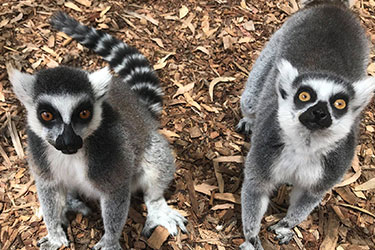 The two lemurs will add genetic variety to the zoo’s current population.
The two lemurs will add genetic variety to the zoo’s current population.Two female ring-tailed lemurs from New Zealand have spent the summer settling into their new home in New South Wales’ Hunter Valley Zoo, after completing their biosecurity clearance.
Once settled in, the new additions will be paired with eligible suitors at the zoo, to help keep the captive population healthy.
Head of the department’s biosecurity operations, Nico Padovan, said the lemurs will add genetic variety to the zoo’s current population, which is important for species conservation.
“Biosecurity officers work closely with zoo officials even before the animals begin their journey to Australia. This is to ensure they aren’t carrying any harmful pests or diseases that could impact animals in Australia,” said Mr Padovan.
Continue reading about meet the Hunter Valley Zoo's newest residents
“The animals spent several weeks in quarantine after arriving in Australia, in line with biosecurity import conditions. These conditions are designed to protect not only native animals, but also farmed and native plant species.”
“Our strong biosecurity system helps Australian zoos to safely import animals and conserve exotic species for future generations. It minimises the risk of exotic diseases threatening our health, animal health and agricultural industries. Without it, we wouldn’t be able to visit zoos and see these beautiful animals.”
Last year the department oversaw the import of a Fiordland crested penguin from New Zealand to Sydney’s Taronga Zoo, and four cheetahs from the United Kingdom to Queensland’s Darling Downs Zoo.
Honey bees aren't so sweet
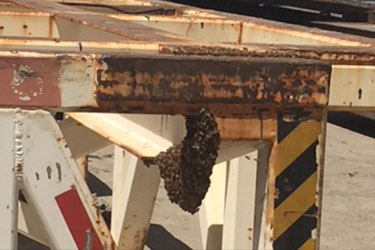 A swarm of bees was discovered on a container stand at the DP World wharf and quickly reported to the department.
A swarm of bees was discovered on a container stand at the DP World wharf and quickly reported to the department.A morning of container inspections turned into a buzz of activity recently when stevedores spotted a swarm of bees at the Port of Brisbane. The swarm was discovered on the DP World wharf while containers were being unloaded and lowered.
Knowing that the bees posed a biosecurity risk, the stevedores held the cargo until our biosecurity officers arrived. Tony Robinson, entomologist, said that the bees were identified as European honey bees.
“Although European honey bees are present in Australia, bees that come from overseas pose a high risk of introducing exotic pests such as Varroa mites, Tropilaelaps mites or Tracheal mites,” said Mr Robinson.
“Local European honey bees in the port also pose a risk, as there is potential for them to cross contaminate if an exotic swarm comes in.”
The department’s National Border Surveillance Team immediately contained the bees, while biosecurity officers investigated the container and interviewed the vessel’s crew. From the evidence gathered, it appeared the swarm was local and had settled on the stand before the container was unloaded from the vessel. The bees were collected for mite screening, and no further risks were identified.
“The interception of the bees illustrates the teamwork and cooperation between staff at the port and with industry,” said Manager of Inspection Services for Eastern Australia, Boris Popovic.
If you have found a pest associated with imported goods, phone the See.Secure.Report. hotline on 1800 798 636.
Learn more about unwanted pests, diseases and weeds.
Don't be a Jeff — Watch our new biosecurity videos
 Don’t be a Jeff and put Australia’s biosecurity at risk.
Don’t be a Jeff and put Australia’s biosecurity at risk.Meet Jeff. Jeff is pretty careless when it comes to biosecurity and his actions could have far greater effects than he realises. Don’t be a Jeff and put Australia’s biosecurity at risk.
Watch these videos to understand why biosecurity matters and ways you can help prevent the establishment and spread of unwanted pests and diseases.
Border finds: Mystery seeds sound the alarm
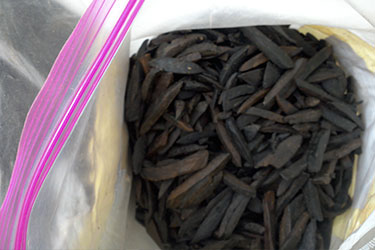
As well as potentially introducing invasive weeds, exotic plant seeds can harbour infectious diseases.
Our biosecurity officers at the Sydney Gateway Facility had an unusual find recently when they inspected a package from Nigeria declared as ‘dried African bean seed.’ After opening the package, the officers found a number of large unusual seeds of biosecurity concern.
After further examination, the seeds were found to be Owala oil beans (Pentaclethra macrophylla) and they tested positive for bacterial infection.
The officers had the seeds destroyed to avoid any risk of the infection spreading.
Exotic seeds can spread diseases to local plants. As well as introducing invasive weeds that could harm Australia’s natural environment and agricultural industries.
We work around-the-clock to enforce Australia’s strict biosecurity border controls. In the 2016-17 financial year, 158 million mail items and 20 million passengers were screened, along with the assessment of 18,000 vessels.
If you’re overseas, it’s important to check that items comply with Australia’s biosecurity requirements before mailing them or bringing them home in your luggage.
For more information visit Travelling or sending goods to Australia.
Border finds: Clamping down on tramp ants
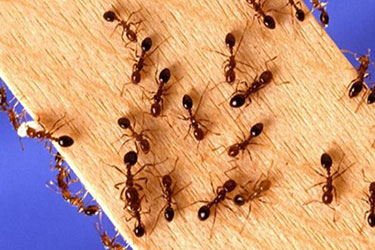
Tramp ants are a diverse group of invasive and aggressive species not present in Australia that have established widely across the globe.
Biosecurity officers at Perth Airport recently discovered some unwanted pests when they inspected a parcel of personal effects sent from Thailand.
They were alerted by an Australia Post staff member who spotted an ant crawling on the outside of the parcel. What they found was a large number of exotic tramp ants (Monomorium salomonis).
The biosecurity officers treated the parcel and the surrounding area. After wrapping the parcel in plastic, they kept it under surveillance for the rest of the day to ensure no other ants had escaped.
A thorough inspection of the parcel and contents was conducted. The biosecurity officers issued a direction to treat the goods with fumigation.
Tramp ants are one of many invasive and aggressive species that are found across the globe. If undetected, tramp ant infestations can spread quickly and lead to damage of our $60 billion agricultural industry. They pose a huge risk to our environment and way of life, and represent a significant biosecurity risk to Australia.
Australian biosecurity is a shared responsibility. If you have found a pest associated with imported goods, phone the See.Secure.Report. hotline on 1800 798 636.
Learn more about unwanted pests, diseases and weeds.
We Want Your Input

The department is currently seeking feedback on:
- Draft review of import conditions for brassicaceous crop seeds for sowing into Australia
- Final report for the review of biosecurity import conditions for Tahitian limes from the Cook Islands, Niue, Samoa, Tonga and Vanuatu
See the latest Import industry advice notices or Export industry and market access notices.
